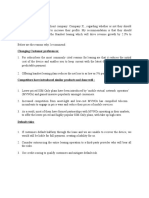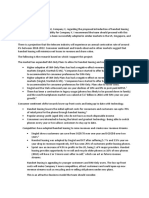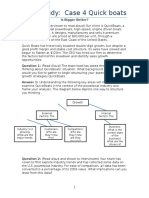Hi elisse,
I have gone through various market and articles of different company regarding handset leasing and after analysing
all the strategies i came to point that handset leasing will be a good idea to be explored.
Due to below reasons i recommend this move :-
Innovative concept :-
In the telecom industry leasing has been available for expensive equipment to enterprise and business
clients for many years, but the concept of offering leased handsets to consumers is relatively new. As a result of
significant efforts to find new revenue sources, i have started to see operators trialing various leasing options
for handsets to consumers.
Also it helps the consumer dealing with new technology of handset coming into this era in an effective
way .
Cost effective :-
As there are some big company(singtel of Singapore) who have adopted this hypothesis of handset leasing
and they have designed there rental programme in a way to make premium handsets more affordable and is
available to customers in sim only plans. Due to which customers will have an option to upgrade their handset
to premium one .
For subscribers the most commonly cited reasons for leasing are that it reduces the initial cost of the device
and enables you to keep current with the latest devices using a regular, predictable payment.
Leasing effectively removes the upfront cost barrier that may have delayed a purchase, or even prevented
the purchase at all.
In some cases like in singtel of singapore which i have gone through In terms of cash outlay, the customer
pays about 50 per cent less over two years for a mobile plan and a rental than for a similar plan with a handset
they end up owning after two years.
In handset leasing monthly rental fees are also substantially lower than purchasing a premium phone with
a contract plan.
Revenue impacts :-
Operators also have potential new revenue from financing charges such as interest, and some have pointed
out that leasing tends to yield more revenue than if the subscriber buys the handset and keeps it for a long time
period.
Other important observations from operators included that offering leasing tends to reduce the need to
offer discounts to attract subscribers, which also had revenue impacts.
I have seen in some company (sprint ) the take rate of leasing plans has surpassed its installment plans in
the last few quarters. As a result, due to the financial benefits of leasing, companies lease revenues could
increase going forward.
I have seen in some telco companies (skt of south korea ) they suffered slowing mobile revenue in their
respective quarters after introducing these leasing handset policy their revenue started attending a good peak
point . It is also beneficial to introduce this leasing in markets where mobile revenue growth has plateaued.
Market capturing :-
As in some country its is already existed an where it is not it will be a good strategy to implement it as it will
capture a large number of customers and ultimately large market which help in profitability of business.
Offering handset leasing to SIM-Only customers is estimated to reduce net losses in revenue from 54% to just
5%
− Each conversion of mobile contract to SIM-Only plan results in estimated net loss of 54% in revenue per
customer.
� − Offering handset leasing plans reduces the net loss to as low as 5% per customer.
After analysing all this point i came to the conclusion that this hypothesis of handset leasing should be expored
and taken into consideration for enhancing the profitability of businesses.
Sources :-
https://www.mobileworldlive.com/devices/blogs-devices/blogs-handset-rentals-offer-surprising-value/
https://marketrealist.com/2017/04/why-sprint-is-focusing-on-handset-leasing-to-accelerate-growth/
https://inform.tmforum.org/digital-transformation-and-maturity/2016/02/the-dilemma-of-leasing/

























































































